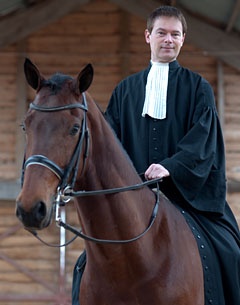
A right of annulment does not mean that the seller can go and pick up the horse. A disappointed buyer has the right to annul or destroy a purchase agreement. In a nutshell, the sale has to be dissolved and this leads to a refund of the purchase price and payment of the additional costs, after which then the horse has to be transferred back to the seller.
On a regular bases it shows that there is still a lot of uncertainty about the significance of annulment and destruction of signed sales contracts. Even if it seems obvious that a contract can be dissolved due to a evident latent defect or if the buyer has been deceived by, for example, the horse appearing to be much older or that it is registered in a much lower class then stated by the seller in the ad, this does not give the buyer the right to terminate the contract himself. If the seller does not cooperate with the annulment or destruction of the contract, the buyer may not take matters into his own hands. S/he will have to go to court to effectuate the desired annulment.
An annulment will lead to the cancellation of the contract. My client was proof that this is not understood by everyone. My client sold a horse and simultaneously traded one, in which case the buyer had to pay a certain amount extra. After the horses were delivered, the buyer regretted his purchase and wanted to undo the transaction. My client did not and relied on the statement that the agreement was concluded and this could not be changed unilaterally. The buyer did not settle with this and, along with two henchmen, decided to pick up the horse like a thief in the night. Just in time the stable manager discovered this embezzlement and blocked the exit. Subsequently, the police was called in, released the horse and returned it to its rightful owner; my client. This was a rude awakening for the buyer.
Meanwhile my client had already reported the theft and trespassing to the police. The reverse version is also not possible. The buyer that has invoked the annulment or destruction of the contract, cannot return the horse to the seller without his consent. In reality this does happen, but this is legally totally unacceptable. When the court has not yet decided, the ownership remains unchanged.
Summarizing, it is true that a disappointed buyer who wishes to dissolve the purchase agreement, might have to wait - mostly - years before the horse actually can go back to the previous owner (seller) namely after the judge has decided this. Vigilantism is prohibited.
I am often asked about this subject and who is exactly responsible for the horse during the annulment process. Firstly, the buyer is still the owner until the horse is transferred back to the seller. If the horse causes damage, the owner-buyer must compensate this damage, but this is usually an insurance issue. Secondly, the risk of sickness, accidents and death rests upon the seller who must take the annulment into account. So if the horse gets sick or dies, the seller must still reimburse the purchase price and the cost to the buyer if the court annuls or destroys the contract. And thirdly it’s only the solemn duty to provide for the horse that rests on the buyers shoulders. This means providing it with food and water and proper housing.
In reality its it is very uncomfortable for the buyer to have to take care of a sick horse for years with the knowledge that after winning the procedure the horse has to go back to the seller. The buyer could also take the horse elsewhere, that would perhaps provide less emotion.
- by Stephan Wensing - www.paardenadvocaat.nl
Weda en Wensing Advocaten, a professional Dutch law corporation, is owned by renowned Stephan Wensing, a Dutch attorney whose practice is only focused on equine disputes. Stephan Wensing has been an equine attorney since 2002. As a horse owner, trainer and judge himself he combines his two passions: horses and law. Stephan recognized the need for an attorney with detailed knowledgeable in legal issues affecting equestrians. Wensing offers a full-service litigation firm that specializes in equine-related transactions and dispute resolution
throughout Europe.
Related Links
Legal Letter: Seized Horses, a Nightmare
Legal Letter: Care Duty of Horse Transporters Much Larger than Thought
Legal Letter: Your Duty to Investigate When Buying a Horse